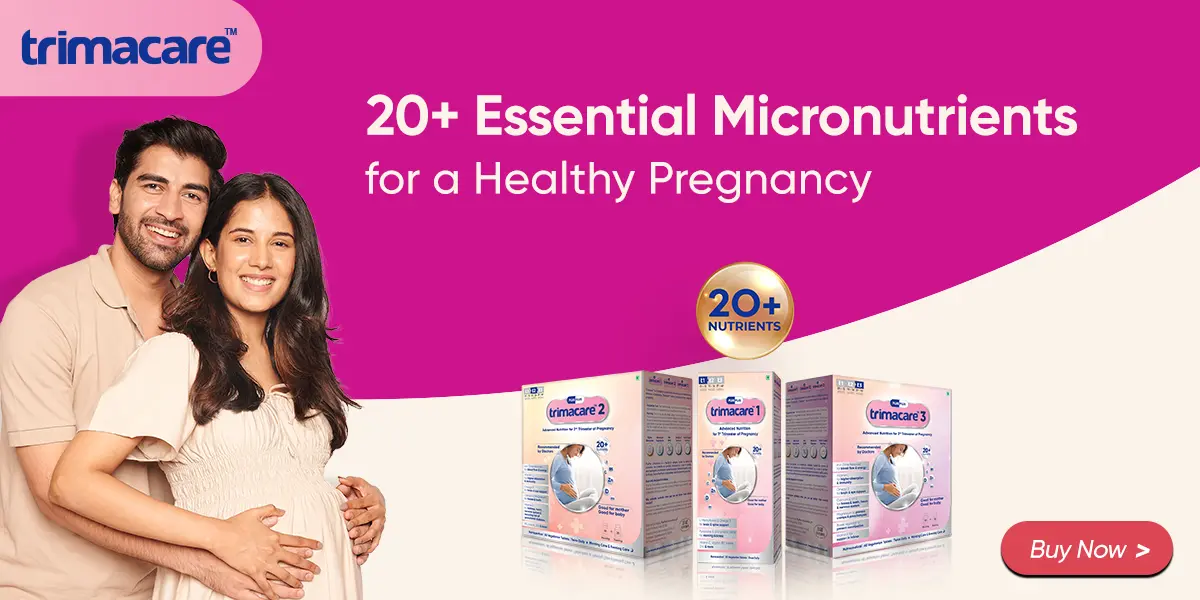Prenatal Vitamins are prenatal supplements that are formulated according to the nutrient requirements of the pregnant mother and the growing baby. Prenatal vitamins prevent nutritional deficiencies in the mother and the growing baby by providing all the essential nutrients that the mother requires during pregnancy. A healthier diet for the mother ensures that the risk of deficiency-related diseases is reduced. Prenatal Vitamins contain nutrients such as Iron, Folate or Folic Acid, Calcium, Iodine, and other micronutrients that are responsible for the optimal health of the mother and the growth of the baby. Consumption of prenatal vitamins for women is essential during pregnancy as the nutrient requirement grows many folds during this transformational period and the nutrients present in the regular diet may not be sufficient. Prenatal vitamins when taken in conjugation with a nutritious diet ensure that the mother is not deficient in any of the required micronutrients.
Prenatal Vitamins contain the right amount of nutrients that are required by the pregnant mother and the baby. Doctors recommend that you consume pregnancy multivitamins or prenatal tablets along with a highly nutritious diet so that the scope of nutrient deficiencies can be minimized.
Most Multivitamins contain Iron, Folate or Folic Acid, and Calcium. However, your prenatal vitamins must contain other micronutrients along with these as they have a significant role to play when it comes to your health and the growth of your baby. Additionally, supplementation with multi-micronutrients helps with the baby’s growth, neurodevelopment, cognitive development, cardio metabolism, pulmonary function, and immune function.
Some important multi micronutrients your prenatal vitamins and pregnancy multivitamin should contain are –
- Folate – L-methylfolate is an active and seven times more bioavailable form of folic acid which makes it more absorbable than folic acid. It is essential for maternal tissue and supports the development of the baby’s brain and spine.
- Vitamin A – This vitamin is responsible for the maintenance of maternal eye health and the baby’s vision and organ development.
- Vitamin D – Vitamin D is important for the absorption of calcium and the bone health of the mother and the baby. It is also required for the development of the kidneys, heart, and nervous system and reduces the risk of gestational diabetes.
- Zinc – Zinc is important for wound healing, immunity, and cell division. It is also important for the prevention of preterm birth and low birth weight.
- Iodine – Iodine contributes to the production and the functioning of thyroid hormones in the mother and supports brain and nervous system development in the baby.
- Vitamin B12 – It is essential for neural tube formation, brain and spine development, and works with folate for DNA synthesis and production of Red Blood Cells. It also aids the metabolism to improve maternal stress levels, mood, and energy.
- Vitamin C – This vitamin helps in collagen production which is important for optimal growth, wound healing, and healthy tissue. Vitamin C is also responsible for increasing immunity and helps in the absorption of iron, thereby preventing anaemia.
- Iron – Iron supports the formation of the blood supply of the baby. It is important for the production of haemoglobin and oxygen transport, which reduces maternal fatigue.
- Omega 3 – This is essential for the development of the baby’s brain and eye, prevents pre-term birth and low weight.
- Calcium – Calcium is important for the development of baby’s bones and teeth. It also has a role to play in muscle contractions, hormone regulation and, nerve cell function.
- Magnesium – Magnesium reduces the risk of growth retardation in babies. It also reduces the risk of hypertension in mothers and treats pregnancy-induced leg cramps.
- Vitamin K – Vitamin K is an important vitamin that supports delivery by reducing the chances of bleeding.
In addition to these micronutrients, some brands also add anti-emetics (Ingredients that prevent nausea) and bowel regulators (Ingredients that are effective in relieving maternal constipation) to make the mother more comfortable while taking prenatal vitamins during pregnancy. Prenatal Tablets are also easy to easy to consume if they have a neutral smell and do not trigger nausea. Pregnancy Multivitamins that are formulated as easy to consume prenatal tablets are a lot easier for the pregnant women to include in her routine.
Trimacare has 20 plus Multi Micronutrients in one pill. These prenatal vitamins that are formulated for consumption trimester-wise are convenient, plant-based, vegan, animal-product free, and highly absorbable due to the high bioavailability of ingredients. This ensures you are getting the prenatal nutrition you require without the hassle of multiple pills.
It is important to consume a balanced diet along with Multi Micronutrient Supplementation so that the nutrition gap between the nutrients required and the nutrients consumed can be filled. The health of your baby depends upon your health, so it is pivotal that you are taking the best quality nutrients approved by the best experts.
Frequently Asked Questions:
1. Why should pregnant women take prenatal vitamins?
Prenatal vitamins are significant during pregnancy as they give fundamental supplements like folic acid, iron, and calcium, which support the sound advancement of the child and assist with forestalling birth deserts.
2. When should pregnant women start taking prenatal vitamins?
It’s prescribed for ladies to begin accepting prenatal vitamins when they begin attempting to consider or when they figure out they’re pregnant, as early supplementation upholds the child’s advancement all along.
3. Can prenatal vitamins replace a healthy diet during pregnancy?
Prenatal vitamins are meant to be a supplement to a healthy diet, not a replacement for it. Pregnant ladies ought to endeavour to eat a reasonable eating regimen wealthy in organic products, vegetables, entire grains, and lean proteins close by taking prenatal vitamins to guarantee they get every fundamental supplement.
4. Are all prenatal vitamins the same, or are there differences?
Although the composition of prenatal vitamins varies, the majority contain similar essential nutrients like folic acid, iron, calcium, and omega-3 fatty acids. It’s fundamental to pick a prenatal vitamin that meets your particular wholesome requirements and talk with your doctor for customized suggestions.
5. What are the potential side effects of taking prenatal vitamins?
Despite the fact that prenatal vitamins are generally safe, some women may experience side effects like nausea, constipation, or stomach upset. On the off chance that you experience any unfavourable responses, it’s fundamental to talk with your doctor who might recommend elective enhancements or acclimations to your measurement.
A Certified Nutritionist with a rich healthcare background in health journalism, the author has immense experience in curating reader-friendly, engaging, and informative healthcare blogs to empower readers to make informed pregnancy-related decisions.












